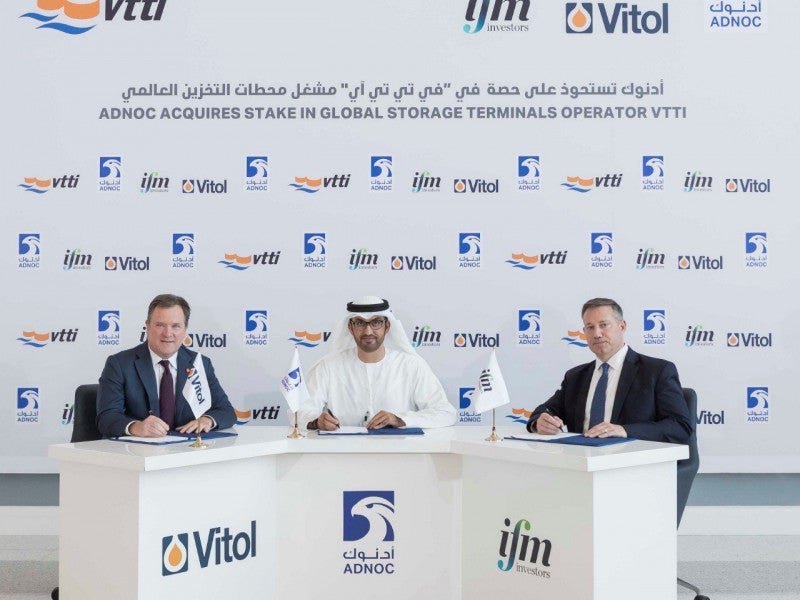The Fujairah underground oil storage project is a 42 million barrels underground crude storage facility to be developed in the Emirate of Fujairah, on the eastern coast of United Arab Emirates (UAE).
Being developed by the Abu Dhabi National Oil Company (ADNOC) with an estimated investment of £900m ($1.2bn), it will be the world’s single biggest underground oil storage facility.
Preliminary works involving the construction of an access tunnel was completed in 2018, while commissioning of the facility is scheduled for 2022.
The Fujairah underground oil storage project is of strategic importance for ADNOC, as it is intended to broaden the company’s global oil trading capabilities by enabling it to respond to its customers’ needs more efficiently and more competitively.
ADNOC’s total oil storage capacity at the port of Fujairah will be increased to 50 million barrels, upon completion of the new oil storage facility.
Fujairah underground oil storage facility details
The Fujairah underground mega oil storage facility will comprise three underground caverns, each capable of storing 14 million barrels of crude oil.
Each cavern will be excavated deep below ground level and will be used to store one of the three different types of crude.
ADNOC already possesses eight million barrels of oil storage capacity at the port of Fujairah.
The Fujairah Terminal’s expanded crude storage capacity, with the new underground storage facility, will help to position the UAE as a reliable crude oil supplier in the international oil market.
The project will not only help in stabilising crude supply within the UAE, but also facilitate export to the rest of the world, responding mainly to the growing oil demand in the Asian market.
Strategic importance of an oil storage facility at the port of Fujairah
The port of Fujairah is strategically crucial for crude storage, due to its tactical location outside the volatile Strait of Hormuz controlled by Iran.
The Persian Gulf trade route is responsible for freighting one-third of the global hydrocarbon consumption. Bypassing the Hormuz chokepoint will end Iran’s long enjoyed dominance over the oil trade route.
Apart from strengthening the UAE’s position as a reliable supplier of crude oil, the strategic mega oil storage facility will also provide ADNOC greater flexibility in its crude delivery schedule management.
It will also enhance ADNOC’s position as a key trading and supply partner in strengthening Fujairah as a global oil and products storage and trading hub.
ADNOC’s daily average oil output is estimated to be three million barrels.
Contractors involved
South Korea’s SK Engineering and Construction (SK E&C) was awarded the engineering, procurement, and construction (EPC) contract for constructing three underground oil storage caverns for the project in February 2019.
Infrastructure facilities at the port of Fujairah
The port of Fujairah will be linked to the Etihad Rail network allowing easy access from the eastern towns of Fujairah and Ghuweifat, bordering Saudi Arabia to the industrial city of Ruwais situated in the western portion of the country.
The port of Fujairah has export terminals to support crude oil transfer to marine vessels for transportation.
Associated infrastructure development involves the construction of a new runway and terminal lounges at the Fujairah Airport as well as expansion of the existing runway and terminal.
ADNOC’s new oil trading and refinery partners
ADNOC is collaborating with Indian Strategic Petroleum Reserves (ISPRL), a wholly-owned subsidiary of Oil Industry Development Board, which is controlled by the Ministry of Petroleum & Natural Gas, Government of India, for developing a seven million barrel capacity strategic underground oil storage facility at Padur, Karnataka.
ADNOC also delivers oil to ISPRL’s existing 5.86 million barrel underground storage facility at Mangalore, Karnataka.
In August 2019, ADNOC tactically acquired a 10% stake in the global storage terminal operator VTTI, which is co-owned by FM Global Infrastructure Fund (45%) and Vitol (45%). ADNOC secured access to VTTI’s storage facilities in Fujairah, as well as to 15 hydrocarbon storage terminals operated by VTTI across 14 different countries through the acquisition.
In July 2019, ADNOC closed refining and trading agreements with ENI and OMV, and created a new trading joint venture named ADNOC Global Trading to trade ADNOC’s refinery products.





